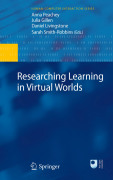
Researching learning in virtual worlds
Peachey, Anna
Gillen, Julia
Livingstone, Daniel
Smith-Robbins, Sarah
Researching Learning in Virtual Worlds covers a range of research undertaken in 3D virtual environments, looking at both the methods and results of the studies. This groundbreaking book is the first to specifically address research methods and related issues for education in virtual worlds. It opens with an accessible introduction to the book and to the subject, providing an ideal springboard for those who are new to research in this area. The subsequent ten chapters present work covering a range of research methodologies across a broad discipline base, making it essential reading for advanced undergraduate or postgraduate researchers working in education in virtual worlds, and engaging background material for researchers in similar and related disciplines. Many of the chapters in this book are extended papers from Researching Learning in Virtual Environments (ReLIVE08), an international conference hosted by the Open University UK. Authors of the best papers and presentations from the conference were invited to contribute to Researching Learning in Virtual Worlds. INDICE: Virtual Environments.-What is inclusive education?.- How much might inclusive education influence virtual world research?.- What might inclusiveeducation look like in virtual worlds?.-Learning, Teaching and Ambiguity in Virtual Worlds.- Defining Second Life.- Contested Definitions and 'community'.-Learning in on-line gaming worlds.- Teaching in Second Life.- The Second Life researcher toolkit.- An exploration of in-world tools, methods and approaches for researching educational projects in Second Life.- Designing Second Life educational research projects.- Defining the type of activity to investigate andthe aims of the research project.- Learning theories and education in virtualworlds.- Approaches to education theory.-Situated learning and Communities ofPractice.- Experimental Learning.- Problem-Based Learning.- Digital game-based Learning.- Ethical Issues.- Terms of Service and Second Life ethical Guidelines.- Obtaining consent.- Identity and privacy.- The virtual participants.- Avatar psychology.- Building your avatar.- Building an avatar.-Physical world and virtual world methods.- Virtual Ethnography.- in SL.- SL research tools.- Practical Aspects of researching education in SL.-Setting the scene, land and venue issues.- Premium and basic accounts.- Educational islands.- Renting from established educational islands.-Expertise required? The SL researcher learningcurve.-Supporting and enhancing participation.- SL cultures and in-world rules.- Disseminating results.- In world conferences, education groups, media and press.- Conclusion.- References.- The Schome Park Programme: exploring educational alternatives.- Introduction.- The Context.- Why use a virtual world?.- The Schome Park Programme.- Overview.- Phase 1.- Phase 2.- Phase 3.- Research Methodology.- Dimensions of Practice.- Experimental vs. Control.- Curriculum Dimensions.- Role and learner voice.- Conclusions.- References.- New Literacies in Schome Park.- Bringing an ethnographic perspective to bear on a virtual world: Schome Park.- Towards a virtual literacy ethnography.- The literacy practices of interactions inworld.- The SPP dictionary.- Conclusions.- References.- The Third Place in Second Life: Real Life Community in a Virtual World.- Introduction.- Locations and activities.- Cetlment Island.- Experimental spaces.- Island design.- Virtual residence.- Living in halls.- Home sweet Schome.- Socialization.- Community building.- Communities.- Roles, identity and communication.- The Third Place.- The character of the Third Place.- The Third Place online.- The Third Place for the OU in Second Life.- Design and delivery of game-based learning for virtual patients in Second life.- A framework for the design of game-based learning for virtual patients.- Influential factors of emerging narrative.- Framework.- Designing rewards.- Web application development.- Interaction and call management.- Learning design.- Interoperability.- Experimentalmethodology.- Subjects.- Results and Analysis.- Attitudinal components.- References.- Learning and Teaching in Virtual Worlds: Boundaries, Challenges and opportunities.- Introduction.- Boundaries, challenges and opportunities.- The diffusion of innovation model and its applications to education.-Time and economics.- Application of the diffusion of Innovation Model to ILE.- Mixed-Methodsand Mixed-Worlds: Introduction.-Mixed Methods.- Involving the community.- Phases of Research.- Engagement in Mixed Worlds.- The Second Pilot.- Time-Shifting of Data Collection.- Land and Servers.- Ease of Use.- Forums.- Participant Engagement.- Applying and Refining the Methods for Usability Testing and Development.- User Centered Design.- Workshop Survey.- Virtual Focus Group.- Social Virtual Worlds, Fun and Learning.- The Edutainment argument.- Growth of virtual worlds in learning.- Defining Social Virtual Worlds.- Motivations and goals.- (Re)creating games.- Ludification of culture.- How can SL-fun be leveraged for learning?
- ISBN: 978-1-84996-046-5
- Editorial: Springer
- Encuadernacion: Cartoné
- Páginas: 318
- Fecha Publicación: 01/04/2010
- Nº Volúmenes: 1
- Idioma: Inglés
